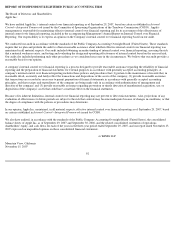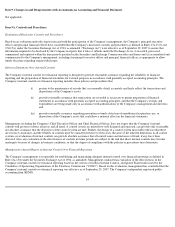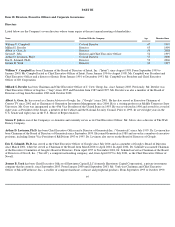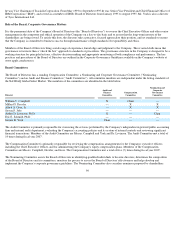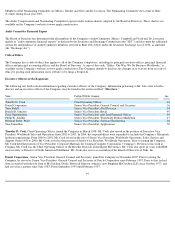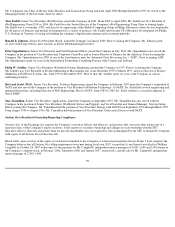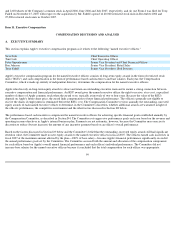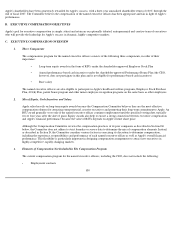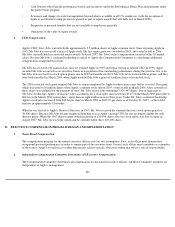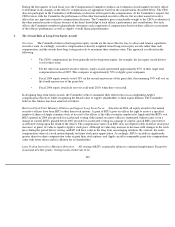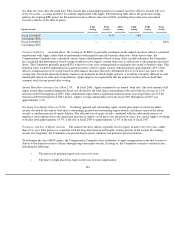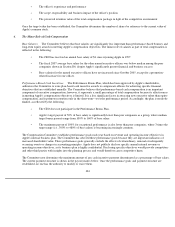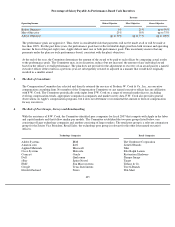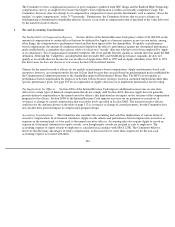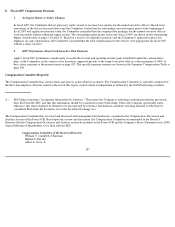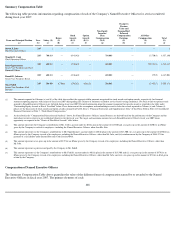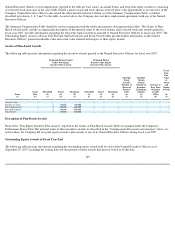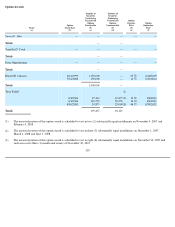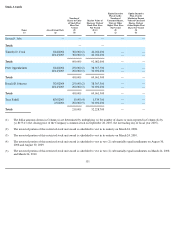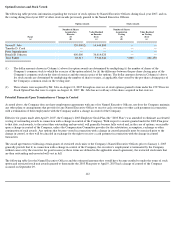Apple 2007 Annual Report Download - page 106
Download and view the complete annual report
Please find page 106 of the 2007 Apple annual report below. You can navigate through the pages in the report by either clicking on the pages listed below, or by using the keyword search tool below to find specific information within the annual report.
During the first quarter of each fiscal year, the Compensation Committee conducts an evaluation of each named executive officer
to determine if any changes in the officer's compensation are appropriate based on the considerations described below. The CEO
does not participate in the Committee's deliberations or decision with regard to his compensation. At the Committee's request, the
CEO reviews with the Committee the performance of the other four named executive officers, but no other named executive
officer has any input into executive compensation decisions. The Committee gives considerable weight to the CEO's evaluation of
the other named executive officers because of his direct knowledge of each officer's performance and contributions. For each
officer, the Committee members independently determine each component of compensation based on their collective assessment
of the officer's performance as well as Apple's overall financial performance.
3.
The Crucial Role of Long
-
Term Equity Awards
Overview. The Committee believes that long-term equity awards are the most effective way to attract and retain a superlative
executive team. Accordingly, executive compensation is heavily weighted toward long-term equity awards rather than cash
compensation, and the awards have long vesting intervals to maximize their retention value. This approach is reflected in the
following:
•
The CEO's compensation has been generally tied to long
-
term equity; for example, his last equity award did not
vest for three years.
• For the other four named executive officers, equity awards represented approximately 85% of their target total
compensation in fiscal 2007. This compares to approximately 70% at Apple's peer companies.
•
Fiscal 2004 equity awards vested 50% on the second anniversary of the grant date; the remaining 50% will vest on
the fourth anniversary of the grant date.
• Fiscal 2006 equity awards do not vest at all until 2010, when they vest in full.
In designing long-term equity awards, the Committee seeks to maximize their effectiveness in accomplishing Apple's
compensation objectives while recognizing the Board's duty to Apple's shareholders to limit equity dilution. The Committee
believes this balance has been achieved as follows:
Restricted Stock Units Minimize Dilution and Support Long-Term Focus. Since fiscal 2004, all equity awards to the named
executive officers have been RSUs rather than stock options. A grant of RSUs gives an officer the right to receive a specified
number of shares of Apple common stock, at no cost to the officer, if the officer remains employed at Apple until the RSUs vest.
RSUs granted in 2004 also provide for accelerated vesting if the named executive officer is terminated without cause or on a
change of control, RSUs granted before 2007 provide for accelerated vesting on a change of control, and all RSUs provide for
accelerated vesting upon the death of the officer. The compensation value of an RSU does not depend solely on future stock price
increases; at grant, its value is equal to Apple's stock price. Although its value may increase or decrease with changes in the stock
price during the period before vesting, an RSU will have value in the long term, encouraging retention. By contrast, the entire
compensation value of a stock option depends on future stock price appreciation. Accordingly, RSUs can deliver significantly
greater share-for-share compensation value at grant than stock options, and Apple can offer comparable grant date compensation
value with fewer shares and less dilution for its shareholders.
Long Vesting Intervals to Maximize Retention. All vesting of RSUs is generally subject to continued employment. Except for
occasional new hire grants, vesting occurs at intervals of no
102


